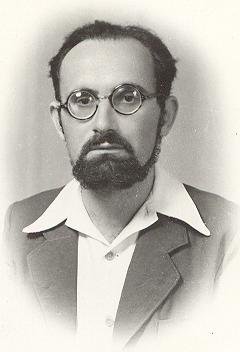Leo Levi was the first scholar to devote research to the Italian Jewish oral musical traditions. However, his role in the field of Jewish ethnomusicology, and in particular in the development of ethnomusicology in Italy, remains to be fully recognized. The grandson of a rabbi, he was an uomo di lettere of wide-ranging interests. His plan to devote a dissertation to the Italian synagogue song was frustrated by the rise of Fascism and anti-Semitism in Italy. During his student years in Turin, he was arrested twice and charged with engaging in subversive activities. A fervent Zionist, he promptly changed his specialization to botany and settled in Palestine in 1936.
Since the Emancipation Edict of 1848, Italian Jewry had- perhaps unconsciously- overlooked its own heritage, striving to integrate with Italy's mainstream culture. Levi's interest must then be seen as groundbreaking, as it proved to be at the end of World War II, when traditional Jewish culture seemed forever lost. He immediately returned to Italy where he established firm relations with the main figures in ethnomusicology, such as Giorgio Nataletti, director of the newly founded (1948) Centro Nazionale Studi di Musica Popolare (CNSMP, now Archivi di Etnomusicologia) of the Academia Nazionale di Santa Cecilia in Rome. A socialist, Levi identified with the interest for the 'music of the people' that permeated the new wave of Marxist-oriented Italian culture of the time. Deeply attached to tradition and to the practice of Judaism, he became the first Italian scholar to research a broad spectrum of liturgical musical traditions, Jewish and Christian. Levi became part of the ethnographic team of the CNSMP and was granted access to the facilities of the RAI-Italian National Radio as a partner in the documentation of Italy's folklore. Between 1954 and 1959 he contacted almost fifty informants, professional hazzanim (synagogue cantors) and other culture-bearers. In over eighty recording sessions, he collected seventy-two audio reels, for a total of some 1000 recorded items. These recordings constitute testimony- in most cases, the only account- to twenty-seven liturgical traditions preserved in the Jewish communities of over twenty Italian cities. RAI personnel inventoried each session following Levi's notes, and the recordings were subsequently kept at the CNSMP. As soon as the National Sound Archives were founded in Jerusalem (1964), Levi obtained a copy of the Rome reels and worked as Research Fellow at the Jewish Music Research Centre.
Throughout the 1960s, Levi also conducted an impressive amount of independent fieldwork, at times in collaboration with Italy's leading ethnomusicologist Roberto Leydi, documenting a variety of Christian (chiefly non-Catholic) liturgical repertoires, as well as Jewish liturgical and folk songs across the Mediterranean and in central and Eastern Asia. While most of his fieldwork still needs to be assessed, the 'Italian collection' has undergone recent study, as its value for the documentation of Italy's Jewish liturgical song is unparalleled. Leo Levi's recordings enable us to draw a picture of the country's Jewish musical traditions prior to their loss: a musical memory derived from its bearers.
For Recordings from the Leo Levi collection, see the JMRC CD, Italian Jewish Musical Traditions from the Leo Levi Collection (1954-1961). Two tracks of the CD are available for listening in the online store.




